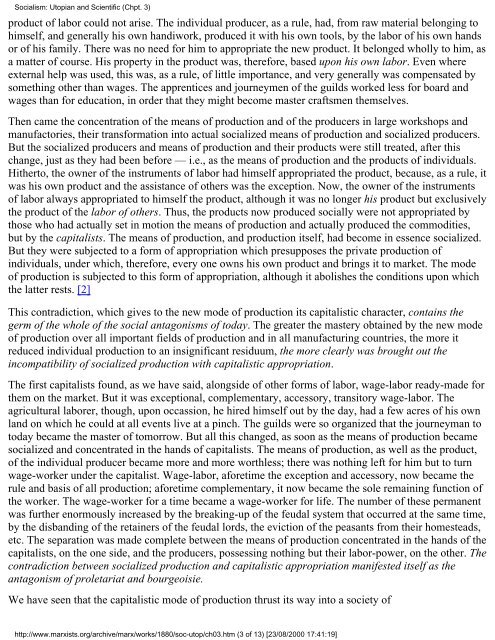Socialism: Utopian and Scientific - MIA
Socialism: Utopian and Scientific - MIA
Socialism: Utopian and Scientific - MIA
Create successful ePaper yourself
Turn your PDF publications into a flip-book with our unique Google optimized e-Paper software.
<strong>Socialism</strong>: <strong>Utopian</strong> <strong>and</strong> <strong>Scientific</strong> (Chpt. 3)product of labor could not arise. The individual producer, as a rule, had, from raw material belonging tohimself, <strong>and</strong> generally his own h<strong>and</strong>iwork, produced it with his own tools, by the labor of his own h<strong>and</strong>sor of his family. There was no need for him to appropriate the new product. It belonged wholly to him, asa matter of course. His property in the product was, therefore, based upon his own labor. Even whereexternal help was used, this was, as a rule, of little importance, <strong>and</strong> very generally was compensated bysomething other than wages. The apprentices <strong>and</strong> journeymen of the guilds worked less for board <strong>and</strong>wages than for education, in order that they might become master craftsmen themselves.Then came the concentration of the means of production <strong>and</strong> of the producers in large workshops <strong>and</strong>manufactories, their transformation into actual socialized means of production <strong>and</strong> socialized producers.But the socialized producers <strong>and</strong> means of production <strong>and</strong> their products were still treated, after thischange, just as they had been before — i.e., as the means of production <strong>and</strong> the products of individuals.Hitherto, the owner of the instruments of labor had himself appropriated the product, because, as a rule, itwas his own product <strong>and</strong> the assistance of others was the exception. Now, the owner of the instrumentsof labor always appropriated to himself the product, although it was no longer his product but exclusivelythe product of the labor of others. Thus, the products now produced socially were not appropriated bythose who had actually set in motion the means of production <strong>and</strong> actually produced the commodities,but by the capitalists. The means of production, <strong>and</strong> production itself, had become in essence socialized.But they were subjected to a form of appropriation which presupposes the private production ofindividuals, under which, therefore, every one owns his own product <strong>and</strong> brings it to market. The modeof production is subjected to this form of appropriation, although it abolishes the conditions upon whichthe latter rests. [2]This contradiction, which gives to the new mode of production its capitalistic character, contains thegerm of the whole of the social antagonisms of today. The greater the mastery obtained by the new modeof production over all important fields of production <strong>and</strong> in all manufacturing countries, the more itreduced individual production to an insignificant residuum, the more clearly was brought out theincompatibility of socialized production with capitalistic appropriation.The first capitalists found, as we have said, alongside of other forms of labor, wage-labor ready-made forthem on the market. But it was exceptional, complementary, accessory, transitory wage-labor. Theagricultural laborer, though, upon occassion, he hired himself out by the day, had a few acres of his ownl<strong>and</strong> on which he could at all events live at a pinch. The guilds were so organized that the journeyman totoday became the master of tomorrow. But all this changed, as soon as the means of production becamesocialized <strong>and</strong> concentrated in the h<strong>and</strong>s of capitalists. The means of production, as well as the product,of the individual producer became more <strong>and</strong> more worthless; there was nothing left for him but to turnwage-worker under the capitalist. Wage-labor, aforetime the exception <strong>and</strong> accessory, now became therule <strong>and</strong> basis of all production; aforetime complementary, it now became the sole remaining function ofthe worker. The wage-worker for a time became a wage-worker for life. The number of these permanentwas further enormously increased by the breaking-up of the feudal system that occurred at the same time,by the disb<strong>and</strong>ing of the retainers of the feudal lords, the eviction of the peasants from their homesteads,etc. The separation was made complete between the means of production concentrated in the h<strong>and</strong>s of thecapitalists, on the one side, <strong>and</strong> the producers, possessing nothing but their labor-power, on the other. Thecontradiction between socialized production <strong>and</strong> capitalistic appropriation manifested itself as theantagonism of proletariat <strong>and</strong> bourgeoisie.We have seen that the capitalistic mode of production thrust its way into a society ofhttp://www.marxists.org/archive/marx/works/1880/soc-utop/ch03.htm (3 of 13) [23/08/2000 17:41:19]














![tyf Enf=O=n]lgg](https://img.yumpu.com/47584932/1/190x245/tyf-enfonlgg.jpg?quality=85)

